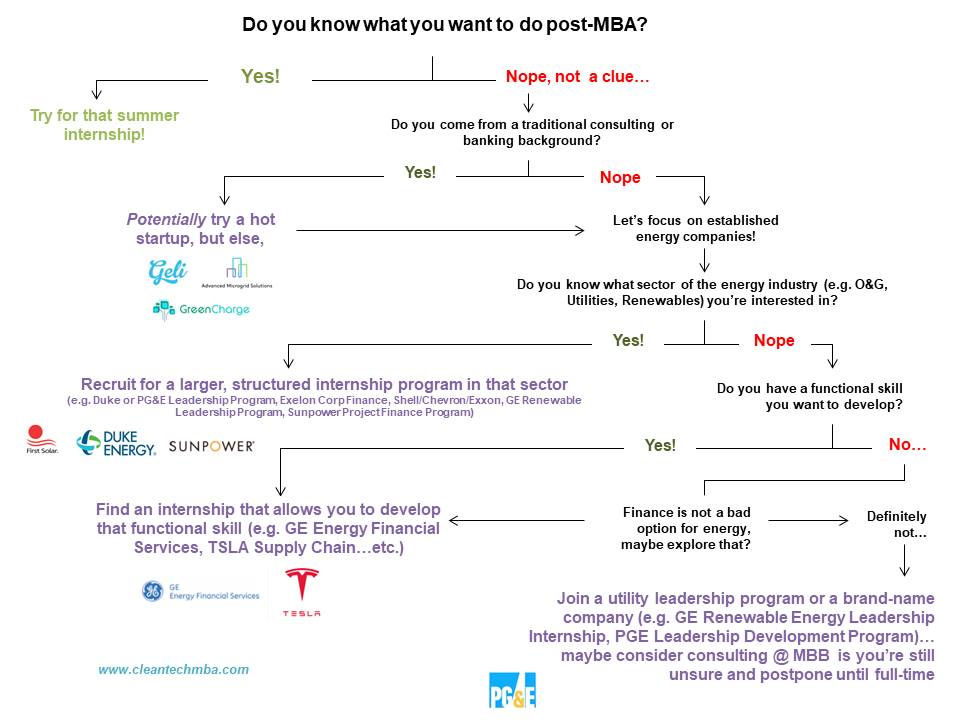How to choose the right one
Summer internships! An important topic that I’ve been asked to write about numerous times and always seems to come up during coffee chats. Should you lock up a safe-bet with a large, established program or aim for just-in-time recruiting for trendy, clean energy startups? What about those leadership development programs? If you’re unsure… I’m going to share my thoughts and perspectives here in this post.
I will caveat that the following advice is written for students who are exploring the energy space and aren’t sure what areas to try rather than those who know their particular post-MBA path. For example, if you’re pretty sure you want to join a utility company post-MBA, you should join a utility program for the summer. For me, I knew I wanted to explore corporate strategy post-MBA, and I had an amazing internship with Flex where I worked closely with their their energy manufacturing business unit. (Also realized afterward I didn’t like strategy as much as I thought I did, so I’m grateful I did it.) Ok, so what if you aren’t so sure?
I think the internship is extremely important and people often do something random because they think it’s only for a summer. The truth is that your choice in summer internship will often come up during full-time interviews, and even a year or two later when you change jobs. In my opinion, it’s essential that you fully consider the impact of your internship and not adopt a ‘try something for the summer and see if I like it’ mentality.
My two big recommendations are to: 1) balance your experience and 2) get functional expertise. Balance should be obvious, but I can’t tell you how many people I’ve seen that don’t use their internships to balance their previous experience. If you come from a non-traditional background (let’s say politics) or a company with little brand recognition (e.g. Joe’s Local Tire Shop), I would highly advise joining an established company and building some brand recognition on the resume. Definitely try to join a large, well-respected company such as PG&E, SCE, GE, AES…etc. If you come from JP Morgan / McKinsey, then by all means, getting some operational-focused experience during your internship will be super helpful. Working at a growth startup in a sales ops or supply chain role will provide you a different and much-needed perspective than the 10,000-ft consulting view you’re used to.
Second, I would highly recommend you pick a functional skillset to fall back on. I’ve seen too many internships where people are just ‘generalists’ helping various parts of the organization. Having interviewed a bunch of these MBA candidates with summer ‘generalist’ backgrounds, it always sounds like they just shadowed a bunch of different people without adding much value (even if they were able to achieve a lot). Energy companies usually are cash-strapped and hire for specific full-time roles, and it’s hard to sell the generalist ’jack of all trades’ experience. I will hire a smart guy or gal with functional expertise over a person who has a ton of energy industry knowledge any day of the week. Also, you could end up hating the energy sector after your internship, but at least you picked up some functional expertise!
Now, should you join a startup? In general, I would strongly advise against joining an energy startup for your summer internship. There are many reasons for this:
You’ll likely be forced to do just-in-time recruiting, and there’s a very high risk you won’t find something you like. The work environment at an energy startup is usually very chaotic. Given there’s much less guidance, it’s less likely you’ll have a good experience. You likely won’t build a great network during your summer compared to an experience at a larger company with supportive alumni.Full-time recruiting companies will want to know whether you’ve secured a return offer. Startups usually can’t give these offers since they won’t know their hiring needs. (also, the fact that the startup may not be around…)
In general, the folks I’ve met who have done summer internships at cleantech start-ups usually don’t like their experience. They don’t build a strong skill set. They don’t get a return offer. The silver lining, however, is that some realize they don’t like the chaos of start-ups and will focus on larger companies during full-time recruiting. If you really want that start-up exposure, it’ll be much easier finding a part-time or school-year startup internship to see what it’s like. It looks much better and is easier to do a summer internship at First Solar and fall internship at XYZ solar startup than the reverse.
So, what should you do? I’ve put together a simple chart as a rough guideline below. If you’re from a non-banking or consulting background, you should look into established internships at larger companies. Pick an energy sector you’re interested in learning more about and a function you’d like to explore. Sunpower has a great project finance internship. GE has a very well-respected and extremely selective financial services/investment internship. PGE, Duke, SCE all have great summer leadership development programs that provide valuable insights into how the utility industry works. Tesla has both supply chain and business operations internship programs for MBAs. Bloom (not treating them as a startup given their total funding, but a controversial company…) supposedly has a great product marketing summer internship. During these internships, one can get a holistic view of a particular sector (solar, power, utilities) pretty quickly, plus you’ll be working alongside fellow MBAs, receive a respectable MBA-wage, and usually have a pretty good experience overall.
When you start your summer internship, make sure to do a kick-ass job and make getting that offer your #1 priority. Hopefully, you love your experience and accept the return offer… you won’t have to go through the grueling full-time energy recruiting process that I and many of my classmates suffered 😊.

Comments